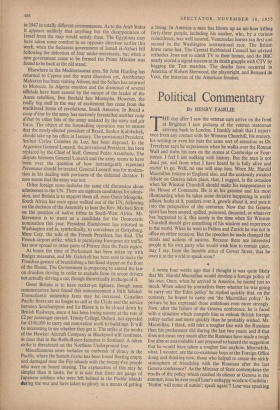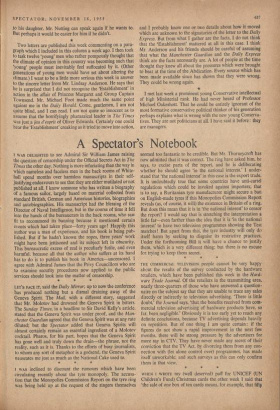Political Commentary
BY HENRY FAIRLIE THE day after I saw the veteran cars arrive on the front at Brighton I saw pictures of the veteran statesman arriving back in London. I frankly admit that I experi- ence from any contact with Sir Winston Churchill, his oratory, his writing or even his hats the same sort of sensation as Dr. Trevelyan says he experiences when he walks over the Roman Wall and stubs his toes on the stones at Cambridge or Four- stones. I feel I am walking with history. But the man is not dead yet, and from what I have heard he is fully alive and rearm' to go. Well, no one will stop him. When Mr. Harold Macmillan returns to England also, and the anxiously awaited debate on Geneva takes place, that, I suggest, is the occasion when Sir Winston Churchill should make his reappearance in the House of Commons. He is at his greatest and his most illuminating when he takes some decisive happening in world affairs, looks at it, ponders over it, growls about it, and puts it into the perspective of the centuries. Now that the Geneva spirit has been soured, spilled, poisoned, decanted, or whatever has happened to it, this surely is the time when Sir Winston Churchill should give something of his wisdom and experience to the world. When he went to Fulton and Zurich he was not in office on either occasion. But the speeches he made changed the minds and actions of nations. Because there are interested people in his own party who would wish him to remain quiet, may I say, from the humble attics of Gower Street, that he owes it to the world to speak soon?
I wrote four weeks ago that I thought it was quite likely that Mr. Harold Macmillan would develop a foreign policy of his own. Once, when he arrived in America, he hinted just so much. When asked by journalists there whether he was going to carry out 'the Eden policy' he replied quickly that, on the contrary, he hoped to carry out 'the Macmillan policy.' In private he has expressed these ambitions even more strongly. Now, after the failure of the Geneva conference, he is faced with a situation which compels him to rethink British foreign policy earlier and more quickly than he probably wished. Mr. Macmillan, I think, will take a tougher line with the Russians than his predecessor did during the last two years; and if that does not mean very much after the Russians have made a tough line almost unavoidable I am prepared to hazard the suggestion that he would have taken a tougher line anyhow. Meanwhile, what, I wonder, are the co-existence boys at the Foreign Office doing and thinking now, those who helped to create the sickly atmosphere of friendship with the Russians after the last Geneva conference? As the Minister of State contemplates the results of the policy which reached its climax at Geneva in the summer, does he ever recall Lear's unhappy words to Cordelia `Nuttin' will come of nuttin'; speak again'? Lear was speaking to his daughter. Mr. Nutting can speak again if he wants to. But perhaps it would be easier for him if he didn't.
Two letters are published this week commenting on a para- graph which I included in this column a week ago. I then took to task twelve 'young' men who rather pompously thought that the climate of opinion in this country was becoming such that `young' people must inevitably feel suffocated by it. (Other generations of young men would have set about altering the climate.) I want to be a little more serious this week in answer to the sincere letter from Mr. Lindsay Anderson. He says that he is surprised that I did not recognise the `Establishment' in action in the affair of Princess Margaret and Group Captain Townsend. Mr. Michael Foot made much the same point against me in the Daily Herald. Come, gentlemen, I am not quite blind, and I can read. I am not quite so innocent as to assume that the horrifyingly pharasaical leader in The Times was just a jeu d'esprit of Oliver Edwards. Certainly one could hear the `Establishment' creaking as it tried to move into action, and I probably know one or two details about how it moved which are unknown to the signatories of the letter to the Daily Express. But from what I gather are the facts, I do not think that the 'Establishment' mattered at all in this case. I think Mr. Anderson and his friends should be careful of assuming that what the Manchester Guardian and the Daily Express think are the facts necessarily are. A lot of people at the time thought they knew all about the pressures which were brought to bear at the time of the Abdication. Every source which has been made available since has shown that they were wrong. They could be wrong again.
I met last week a prominent young Conservative intellectual of high Ministerial rank. He had never heard of Professor Michael Oakeshott. That he could be entirely ignorant of the most formative conservative political thinker of his generation perhaps explains what is wrong with the new young Conserva- tives. They are not politicians at all. I have said it before : they are managers.











































































 Previous page
Previous page